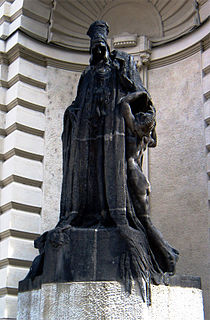
A golem is an animated anthropomorphic being in Jewish folklore which is entirely created from inanimate matter. In the Psalms and medieval writings, the word golem was used as a term for an amorphous, unformed material.

The Dreyfus affair was a political scandal that divided the Third French Republic from 1894 until its resolution in 1906. "L'Affaire", as it is known in French, has come to symbolise modern injustice in the Francophone world, and it remains one of the most notable examples of a complex miscarriage of justice and antisemitism. The role played by the press and public opinion proved influential in the conflict.

Judah Loew ben Bezalel, also known as Rabbi Loew, the Maharal of Prague, or simply the Maharal, was an important Talmudic scholar, Jewish mystic, and philosopher who, for most of his life, served as a leading rabbi in the cities of Mikulov in Moravia and Prague in Bohemia.
Wilhelm Herzog was a German historian of literature and culture, dramatist, encyclopedist, and pacifist.

Aribert Reimann is a German composer, pianist and accompanist, known especially for his literary operas. His version of Shakespeare's King Lear, the opera Lear, was written at the suggestion of Dietrich Fischer-Dieskau, who sang the title role. His opera Medea after Grillparzer's play premiered in 2010 at the Vienna State Opera. He was a professor of contemporary Lied in Hamburg and Berlin. In 2011, he was awarded the Ernst von Siemens Music Prize for his life's work.

Basch Viktor Vilém, or Victor-Guillaume Basch was a French politician and professor of germanistics and philosophy at the Sorbonne descending from Hungary. He was engaged in the Zionist movement, in the Ligue des droits de l'homme and in Anti-Nazism.

Leo Blech was a German opera composer and conductor who is perhaps most famous for his work at the Königliches Opernhaus from 1906 to 1937, and later as the conductor of Berlin's Städtische Oper from 1949 to 1953. Blech was known for his reliable, clear, and elegant performances, especially of works by Wagner, Verdi, and Bizet's Carmen, and for his sensitivity as an accompanist.
The Buber-Rosenzweig-Medaille is an annual prize awarded since 1968 by the Deutscher Koordinierungsrat der Gesellschaften für Christlich-Jüdische Zusammenarbeit (DKR; German Coordinating Council of Societies for Christian-Jewish Cooperation) to individuals, initiatives, or institutions, which have actively contributed to Christian–Jewish understanding. Forty-four different societies belong to the DKR. The name of the prize honors the memory of the Austrian-Jewish philosopher, translator, and educator Martin Buber (1878–1965) and the German-Jewish theologian Franz Rosenzweig (1886–1929). In its inaugural year, the prize was granted to both the historian Friedrich Heer and the Protestant theologian Friedrich-Wilhelm Marquardt.
Golem is a one-act opera by Nicolae Bretan to his own libretto, based on the legend of the Golem as expressed in a drama by Illés Kaczér. It was written over a brief period in 1923, and was first performed on 23 December 1924 at the Hungarian Opera, Cluj.
Barrie Kosky is an Australian theatre and opera director.
Irene Eisinger was a German and British opera singer and film actress. Her career was closely linked to the foundation and the early years of the Glyndebourne Festival Opera.
Hans Rehfisch, also known as Hans José Rehfisch or H.J. Rehfisch, was a German playwright, short story writer and film script writer.
Christof Loy is a German stage director especially for opera, whose work received several awards. A freelance director, he has staged operas from Baroque to premieres of new works at major European opera houses and festivals. He is known for directing works by Mozart.
Anselm Gerhard is a German musicologist and opera scholar.

Die wundersame Schustersfrau is an opera in two acts by Udo Zimmermann, with a libretto which he wrote with Eberhard Schmidt based on the 1930 Spanish play La zapatera prodigiosa, a farsa violenta by Federico García Lorca and translated by Enrique Beck. The opera was first performed on 25 April 1982 at the Schlosstheater Schwetzingen, staged by Alfred Kirchner.
Sigrid Neef is a German musicologist and theatre scholar, focused on Russian and Soviet opera. She has been a dramaturge of the director Ruth Berghaus at the Deutsche Staatsoper Berlin for decades.
Stephan Stompor was a German musicologist and dramaturg.
Andreas K. W. Meyer is a German dramaturge and journalist.
Titus Engel is a Swiss conductor with a focus on both contemporary opera and Baroque opera in historically informed performance.
Joachim Herz was a German Opera director and manager. He learned at the Komische Oper Berlin as an assistant to Walter Felsenstein. His major stations were the Leipzig Opera where he opened the new house with Wagner's Die Meistersinger von Nürnberg, Komische Oper and Semperoper in Dresden, where he opened the restored house with Weber's Der Freischütz in 1985. He staged many world premieres, and worked internationally. Herz was the first director to apply Felsenstein's concepts to Wagner's Der Ring des Nibelungen, staged in Leipzig from 1973 to 1976.







